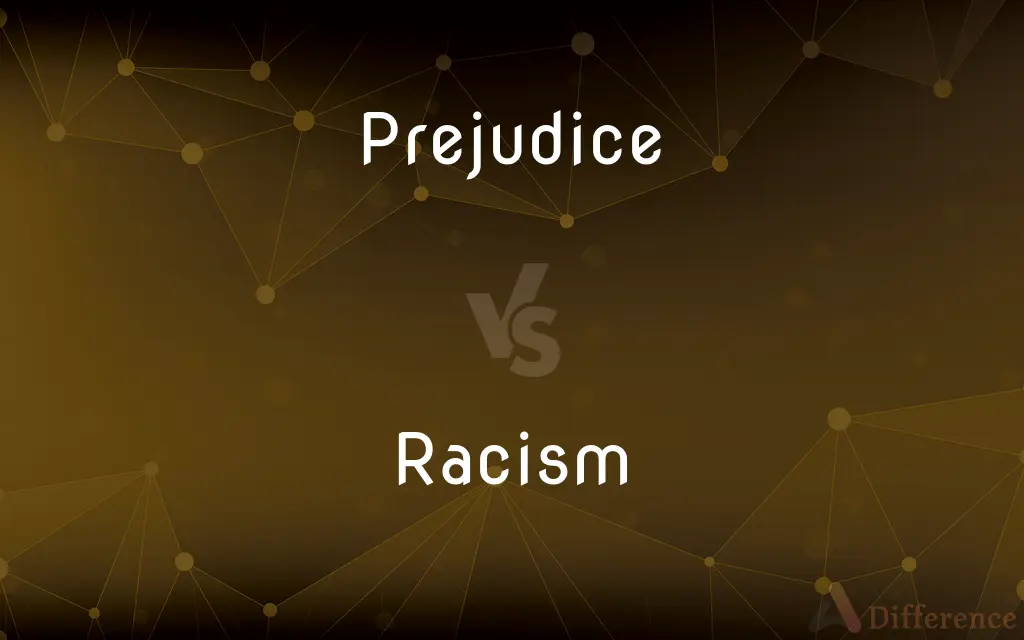Prejudice vs. Racism — What's the Difference?
By Fiza Rafique & Urooj Arif — Published on March 5, 2024
Prejudice involves preconceived opinions not based on reason, affecting any social group, while racism refers to prejudice, discrimination, or antagonism directed against someone of a different race based on the belief that one's own race is superior.

Difference Between Prejudice and Racism
Table of Contents
ADVERTISEMENT
Key Differences
Prejudice and racism are interconnected concepts, with racism being a specific form of prejudice. Prejudice encompasses a broad spectrum of preconceived judgments or biases against individuals or groups, based on characteristics such as age, gender, social status, and more, in addition to race. It is an attitude that can lead to negative or positive assumptions about someone without knowing them personally.
Racism, however, specifically focuses on race and ethnicity, involving systemic and institutional practices that discriminate against certain races, as well as individual beliefs and actions that perpetuate the idea of racial superiority and inferiority.
Prejudice is often rooted in stereotypes and lacks a factual basis, stemming from ignorance, fear, or misunderstanding. It can manifest in various aspects of social life, influencing behavior, decisions, and interactions in subtle or overt ways. Racism, on the other hand, not only includes personal attitudes and beliefs but also involves institutional and societal structures that enforce discrimination and inequality based on race. It is more deeply ingrained in societal systems, affecting economic, legal, and political frameworks.
Both prejudice and racism impact individuals and groups negatively, leading to exclusion, marginalization, and violence. However, racism has more profound and systemic effects, contributing to longstanding inequalities and disparities in health, wealth, education, and justice. The fight against racism thus requires addressing not only individual attitudes but also structural and institutional mechanisms that sustain racial inequalities.
Prejudice can be countered through education, exposure, and personal reflection, while combating racism involves systemic change, including policy reforms, legal actions, and collective efforts to dismantle racist ideologies and practices. Recognizing the distinction between prejudice and racism is crucial in understanding the complexity of social inequalities and working towards a more inclusive and equitable society.
ADVERTISEMENT
Comparison Chart
Definition
A preconceived opinion not based on reason or actual experience.
Prejudice, discrimination, or antagonism based on race, believing one's race is superior.
Scope
Can target various social groups based on multiple characteristics.
Specifically targets racial or ethnic groups.
Manifestation
Individual attitudes and behaviors.
Individual attitudes, behaviors, and systemic inequalities.
Root Causes
Stereotypes, ignorance, fear.
Belief in racial superiority, historical and institutional power imbalances.
Impact
Can lead to social exclusion and marginalization.
Results in systemic inequality, oppression, and marginalization.
Solutions
Education, exposure, personal reflection.
Systemic change, policy reform, anti-racist education and action.
Compare with Definitions
Prejudice
An unjustified or incorrect attitude towards an individual based solely on group membership.
His prejudice against older employees led him to hire only younger applicants.
Racism
A belief in the superiority of one race over another, often resulting in discrimination.
Racism in the workplace led to unequal opportunities for advancement.
Prejudice
Can be positive or negative but always involves a preconception.
Despite his achievements, he faced prejudice for his background.
Racism
Can be systemic, affecting political, social, and economic systems.
Systemic racism has created significant health disparities between racial groups.
Prejudice
Often stems from stereotypes and misinformation.
Her prejudice towards other cultures diminished after she traveled abroad.
Racism
Involves both personal attitudes and institutional practices.
His commitment to fighting racism includes challenging biased policies in his organization.
Prejudice
Affects judgment and can lead to discrimination.
Prejudice in the community made it difficult for newcomers to feel welcome.
Racism
Leads to social and economic inequality.
The legacy of racism has affected generations, limiting access to quality education and housing.
Prejudice
Can be directed at any characteristic, such as race, gender, or age.
She is working to overcome her prejudices to become a better ally.
Racism
Requires concerted efforts for change, including education and policy reform.
Addressing racism requires dismantling structures that perpetuate inequality.
Prejudice
The act or state of holding unreasonable preconceived judgments or convictions
“This is not actually a volume of the best short stories … These are just the stories that I like best, and I am full of prejudice and strong opinions” (Ann Patchett).
Racism
The belief that race accounts for differences in human character or ability and that a particular race is superior to others.
Prejudice
An adverse judgment or opinion formed unfairly or without knowledge of the facts
A boy with a prejudice against unfamiliar foods.
Racism
Discrimination or prejudice based on race.
Prejudice
Irrational suspicion or hatred of a particular social group, such as a race or the adherents of a religion.
Racism
The belief that there are distinct human races with inherent differences which determine their abilities, and generally that some are superior and others inferior.
Prejudice
To affect detrimentally or harmfully by a judgment or act
Negative media coverage prejudiced people's opinion of the mayor.
Racism
Prejudice or discrimination based upon race or ethnicity; (countable) an action of such discrimination.
Prejudice
(countable) An adverse judgment or opinion formed beforehand or without knowledge of the facts.
Racism
The prejudice that members of one race are intrinsically superior to members of other races
Prejudice
(countable) A preconception, any preconceived opinion or feeling, whether positive or negative.
Racism
Discriminatory or abusive behavior towards members of another race
Prejudice
An opinion or judgment formed without due examination; prejudgment; a leaning toward one side of a question from other considerations than those belonging to it; an unreasonable predilection for, or objection against, anything; especially, an opinion or leaning adverse to anything, without just grounds, or before sufficient knowledge.
Though often misled by prejudice and passion, he was emphatically an honest man.
Prejudice
To obstruct or injure by prejudices, or by previous bias of the mind; hence, generally, to hurt; to damage; to injure; to impair; as, to prejudice a good cause.
Seek how may prejudice the foe.
Prejudice
A partiality that prevents objective consideration of an issue or situation
Common Curiosities
What causes prejudice?
Prejudice is caused by stereotypes, ignorance, and fear of the unknown or unfamiliar, often passed down through cultural or societal norms.
Can prejudice be positive?
Yes, prejudice can sometimes be positive, involving overly favorable preconceptions about a group, but it is still based on stereotypes rather than individual merit.
Are all forms of prejudice based on negative beliefs?
Not all forms of prejudice are based on negative beliefs; some can stem from positive stereotypes, though these are still oversimplifications and harmful.
How does racism affect society?
Racism affects society by perpetuating inequality and injustice through systemic discrimination, affecting access to resources, opportunities, and fair treatment.
Is racism only a problem in certain countries?
No, racism is a global issue affecting societies worldwide, manifesting in different forms based on historical, social, and economic contexts.
Can racism exist without prejudice?
Racism inherently involves prejudice as it is based on preconceived notions of racial superiority and inferiority, but it also includes systemic aspects beyond individual biases.
How does systemic racism differ from individual racism?
Systemic racism refers to the embedded inequalities in societal structures and institutions, while individual racism involves personal beliefs and actions against other races.
Why is it important to acknowledge systemic racism?
Acknowledging systemic racism is crucial for understanding the depth of racial inequalities and addressing the root causes of discrimination beyond individual prejudices.
What is the difference between prejudice and racism?
Prejudice is a broad term for preconceived opinions not based on fact, affecting any group, while racism specifically refers to beliefs, discrimination, or antagonism based on race.
How can we fight racism?
Fighting racism requires both individual actions, like education and challenging personal biases, and systemic changes, including policy reforms and promoting equity and justice.
What role do education and awareness play in combating prejudice and racism?
Education and awareness are crucial in combating both by challenging stereotypes, providing accurate information, and fostering empathy and understanding across different groups.
How do institutional practices contribute to racism?
Institutional practices contribute to racism by embedding discriminatory policies and practices within legal, educational, economic, and political systems, perpetuating inequality.
Can individuals be racist towards their own race?
Individuals can internalize societal racism towards their own race, manifesting in self-deprecating attitudes or preferences for other races due to societal influences.
What is the impact of racism on mental health?
Racism significantly impacts mental health, leading to stress, anxiety, depression, and trauma among those who experience racial discrimination and marginalization.
How can allyship help in combating racism?
Allyship involves individuals from non-marginalized groups using their privilege to advocate for and support marginalized groups, playing a key role in combating racism by amplifying voices and demanding change.
Share Your Discovery

Previous Comparison
White Box Testing vs. Black Box Testing
Next Comparison
Vascular Plants vs. Nonvascular PlantsAuthor Spotlight
Written by
Fiza RafiqueFiza Rafique is a skilled content writer at AskDifference.com, where she meticulously refines and enhances written pieces. Drawing from her vast editorial expertise, Fiza ensures clarity, accuracy, and precision in every article. Passionate about language, she continually seeks to elevate the quality of content for readers worldwide.
Co-written by
Urooj ArifUrooj is a skilled content writer at Ask Difference, known for her exceptional ability to simplify complex topics into engaging and informative content. With a passion for research and a flair for clear, concise writing, she consistently delivers articles that resonate with our diverse audience.














































